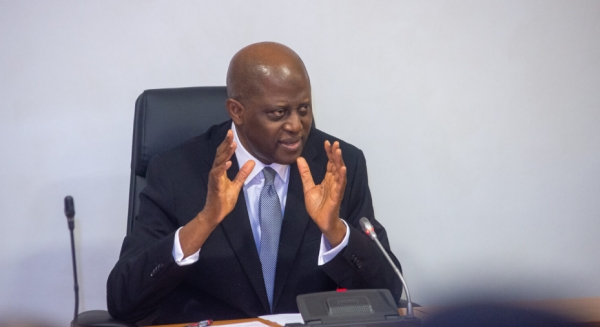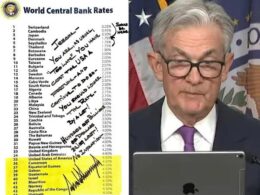When Olayemi Cardoso assumed the role of Governor of the Central Bank of Nigeria (CBN) in September 2023, one of his priorities was to restore investor confidence in the Nigerian market.
Recognising the damage done to investor sentiment by previous policy inconsistencies and a lack of transparency, Cardoso emphasised the urgent need to rebuild trust in the CBN as an institution. He pledged to steer the bank toward greater professionalism, transparency, and independence.
In his early statements, Cardoso highlighted the importance of “anchoring expectations”, a term reflecting the CBN’s role in guiding market confidence through credible, forward-looking policies. He also underscored the need for policy clarity, consistency, and transparency to re-establish the CBN as a trustworthy steward of Nigeria’s monetary and financial system.
A major priority for Governor Cardoso was stabilising Nigeria’s foreign exchange market, which had long been plagued by multiple exchange rates and a substantial backlog of unmet FX demands — issues that significantly undermined foreign investor confidence.
Thanks to a series of reforms, the CBN announced that it had successfully cleared all valid FX backlogs, totaling approximately $7 billion. In a further sign of improved macroeconomic management, the CBN recently reported that Nigeria’s net foreign exchange reserves surged to $23.11 billion by the end of 2024 — the highest level in over three years.
This marks a dramatic recovery from $3.99 billion in 2023, $8.19 billion in 2022, and $14.59 billion in 2021, showcasing the apex bank’s deliberate strategy to restore FX liquidity and rebuild investor confidence through the steady growth of reserves.
Highlighting the key factors behind the improved net foreign reserve position, Cardoso revealed that he and his team worked through cutting short term FX liabilities which involved the significant reduction in the reliance on FX swaps and forward contracts thereby easing liquidity risks.
Secondly, there was increased FX inflows from sectors outside oil and gas such as the financial services, telecommunications and agriculture (crop production) have kick-started the much needed diversification while there has been market driven reforms such as new FX code and the Electronic Foreign Exchange Matching System (EFEMS).
In addition, the CBN’s deliberate shift back to orthodox monetary policy — signaled most notably by the significant hike in the Monetary Policy Rate (MPR) in 2024, played a critical role in attracting foreign portfolio inflows (FPIs).
It is noteworthy to state that the positive shift in Nigeria’s foreign exchange reserves contributed significantly to the recent stabilisation of the exchange rate, particularly in the final months of 2024 and into early 2025.
Following the CBN’s announcement on the surge in net reserves, the naira strengthened by N5.57, closing at N1,531.25/$1 in the official market — up from N1,536.82/$1 the previous trading day. This appreciation came amid prior speculation about the true state of Nigeria’s reserves, as the CBN had not published updated figures for some time.
Gross reserves had been continuously dropping in 2025 week-on-week (w/w) which was beginning to worry analysts but this report on the significant increase in net reserves from 2023 to 2024 brought much needed support to the market before the start of the long holiday period.
It remains to be seen if going forward the apex bank would start reporting the net reserves position on a more regular basis especially as it is in a more positive position now.
There had been many reports by local and international analysts in the second half (H2) of 2023 about the net reserves positions given the number of swaps and other derivatives entered into by the previous leadership in a bid to try and shore up dollar liquidity.
The CBN’s initial silence in response to mounting reports and speculation further undermined confidence in the FX market at the time, contributing to the significant depreciation of the naira.
Market participants grew increasingly anxious amid rumors that Nigeria’s net reserves had fallen to critically low levels, raising doubts about the apex bank’s capacity to effectively intervene in the foreign exchange market.
This perceived lack of transparency and the uncertainty around CBN’s true position weakened investor sentiment, reinforcing fears of liquidity constraints and fueling further volatility in the naira.
Reacting to the improved net reserves position, analysts at Coronation Asset Management, said that the figure reported at the end of 2024 indicates that several of the FX swaps and derivative contracts previously entered into by the CBN have likely been settled or unwound.
According to them, this progress was largely made possible by a significant surge in foreign portfolio inflows (FPI), driven by an attractive carry trade environment following the MPR hike, as well as increased confidence in Nigeria’s monetary direction.
“Additional FX inflows came from a combination of improved oil production, the successful issuance of a Eurobond in November 2024, and other major financing sources, including the $1 billion syndicated loan secured by the Bank of Industry (BOI) in October 2024, and the $900 million domestic U.S. dollar bond issued in September 2024.
“Together, these inflows provided the liquidity needed not only to rebuild reserves but also to unwind obligations that had previously constrained the CBN’s market operations and transparency”, they said.
Also commenting, the Chief Economist and Partner, SPM Professional, Paul Alaje, explained that the surge in reserves resulted from high bond interest rates, especially from portfolio investors, as well as crude oil sales and borrowing.
He noted that previously, the NNPC was not remitting funds to the government account; it operated on a direct spending system. “Now, payments go through the CBN, which remits the naira equivalent. Consequently, it is expected that the reserves will increase,” Alaje said.
In conclusion, the CBN’s reforms in 2024 have not only stabilised the naira and rebuilt its foreign exchange reserves but have also sent a clear message to the global investment community that Nigeria is committed to financial transparency, fiscal responsibility, and market-driven growth.
As investor confidence strengthens and Nigeria’s financial markets become increasingly attractive, the country is poised to benefit from sustained capital inflows, economic stability, and long-term growth.
The path laid out by Governor Cardoso and the CBN is one that promises a more secure, resilient, and prosperous Nigerian economy — one that is capable of weathering future global uncertainties and providing value for both local and international investors.








